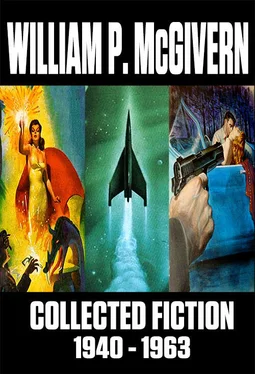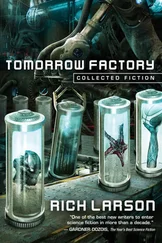Уильям Макгиверн - Collected Fiction - 1940-1963
Здесь есть возможность читать онлайн «Уильям Макгиверн - Collected Fiction - 1940-1963» весь текст электронной книги совершенно бесплатно (целиком полную версию без сокращений). В некоторых случаях можно слушать аудио, скачать через торрент в формате fb2 и присутствует краткое содержание. Год выпуска: 2014, Издательство: Jerry eBooks, Жанр: Ужасы и Мистика, Фантастика и фэнтези, Детектив, Прочие приключения, на английском языке. Описание произведения, (предисловие) а так же отзывы посетителей доступны на портале библиотеки ЛибКат.
- Название:Collected Fiction: 1940-1963
- Автор:
- Издательство:Jerry eBooks
- Жанр:
- Год:2014
- ISBN:нет данных
- Рейтинг книги:3 / 5. Голосов: 1
-
Избранное:Добавить в избранное
- Отзывы:
-
Ваша оценка:
- 60
- 1
- 2
- 3
- 4
- 5
Collected Fiction: 1940-1963: краткое содержание, описание и аннотация
Предлагаем к чтению аннотацию, описание, краткое содержание или предисловие (зависит от того, что написал сам автор книги «Collected Fiction: 1940-1963»). Если вы не нашли необходимую информацию о книге — напишите в комментариях, мы постараемся отыскать её.
Collected Fiction: 1940-1963 — читать онлайн бесплатно полную книгу (весь текст) целиком
Ниже представлен текст книги, разбитый по страницам. Система сохранения места последней прочитанной страницы, позволяет с удобством читать онлайн бесплатно книгу «Collected Fiction: 1940-1963», без необходимости каждый раз заново искать на чём Вы остановились. Поставьте закладку, и сможете в любой момент перейти на страницу, на которой закончили чтение.
Интервал:
Закладка:
8
Irish folklore is full of beliefs about the “little people,” both good and bad. Perhaps the most famous of them all are the leprechauns, who are said to be invisible, except to true Irishmen, and only to them on certain occasions. They are, insist the Irish, the “voice” we call conscience.
9
Obviously the Ussarian delegate who presented the hammer of Thor, anticipating the usual procedure of the Senate, did not expect the Vice-President to use the hammer before he was forced to make his departure. This was to have been a special, closed session of the Senate, and no foreigners would have been allowed at the actual proceedings. Thus, it is probable that his intention in backing away was to get out of range of the full devastation of the hammer when it should fall.
It is well known that in the dictator countries, the life of the individual is placed secondary to the country, and it is also possible that, although using as much caution as possible, the delegate was willing to face certain death to attain consummation of the plot against the Senate.
10
When the Lease-lend bill was passed by Congress, it was the opinion of many statesmen and correspondents that it would eventually mean United States navy convoying of the materials to be shipped to Britain. As it turned out, this was what happened, and U.S. ships took up patrol duty far into the Atlantic, and cooperated with British ships in warning of the presence of raiders. No actual fighting, or shooting was the result, except one instance reported by Secretary Knox, of a destroyer dropping depth bombs during rescue work.
11
This is the accepted method of convoying. Subs usually lie in wait, motors silent, or come up from the rear, or flank a convoy. Thus, the “ears” of the destroyers must detect them before they get within striking distance, and chase them away or sink them with depth bombs. This is possible because of their great speed.
12
This is the case when destroyers go on a hunt for submarines, but in a convoy, the menace to an undersea boat is less, because the sub can, and does, submerge and lie quiescent until the convoy and destroyers are past. Then it can resume its voyage. However, when a sub is picked up by a convoy boat, its location can very swiftly be plotted, and by sweeping back and forth over the area, dropping depth charges, it is quite possible that the sub is doomed. A depth charge does not have to hit a submarine, but merely explode nearby. The concussion in the water does the rest.
13
Shortly after the Lend-lease program got underway, British officials revealed to American officials the real truth of losses in the Atlantic. For a time, debate was hot in the Senate, because it was claimed Britain was “angling” for actual convoys and the losses were not true.
14
Early in 1941 it was reported that the Nazis were preparing a vast submarine campaign, and were constructing hundreds, perhaps even thousands, of undersea boats. For a time, Germany launched its entire submarine fleet at convoys off Scotland, and in the North Sea, and off Gibraltar, and losses were terrible. Yet, these were the giant subs of the Nazi fleet, and they were soon recalled. When the British heard of the pocket-subs, with their meager cruising radius, they scoffed, because it was obvious that they were only coastal craft, and could constitute no menace in the Atlantic. But they did not suspect that these craft were intended for a base far at sea, and under it!
15
Plato places the final destruction of Atlantis about 9,000 B.C. The submergence was gradual, and it was known to the scientists of Atlantis that it was coming. However, the last submergence was cataclysmic, and volcanic action accompanied it. It is believed that the Mediterranean Basin was flooded when Atlantis sank.
16
The sealed halls of Atlantis were not all undamaged by the earthquakes, and many of them filled with water. It was these that the Nazi engineers pumped dry and repaired for use as bases for the pocket-submarine fleet. The ingenuity of the German engineer is well-known, but it must have been a tremendous task to empty those vast halls, construct locks and entrances for the submarines, and maintain a sufficient air pressure to care for all the wants of the base.
17
Had the Nazis, when they originally began work on. the Atlantis base, gone beyond this bronze door, they might have saved a lot of time and labor, since the halls beyond were not flooded. Fortunately they did not, or 1941 might have seen disaster for Britain in the Atlantic.
18
Early in August, 1941, Franklin D. Roosevelt, president of the United States, and Winston Churchill, prime minister of Britain, met in their history-making rendezvous in the Atlantic for a peace conference which resulted in the famous “Eight Points.” Later it was divulged that Aid to Britain was a chief topic of discussion, and the vast convoy that was slated for destruction by Von Herrman’s murderous submarine fleet, was planned and the combined might of the British and American navies was scheduled for the convoy. Upon this one convoy the fate of the war hung, all unknown by the two famous men. If it had been destroyed, and the British and American main fleets wiped out, the war would have been Hitler’s. American public opinion, at the time of the conference, would have been against this “pooling” of the great fleets, but as events turned out late in 1941, the opportunity was presented to turn suspense into certain victory.
19
Late in Atlantis’ last days, much of it being submerged, it became necessary to depend to greater and greater extent on the foodstuffs of the sea for existence. Therefore, fishing became an important factor for continued existence, and new methods were devised. The hydrogen gun was invented, and worked on a principle of breaking down the water into its component gases. Fish, caught in the huge bubbles, suffered an expansion of their gills and consequent shock that stunned them upon emergence into water again. They then floated to the surface and were easily captured. The principle of this breaking down of water into its gases is a simple one, being simply a matter of electrolysis. Two electrodes, giving off a current, as in a battery, cause the action to take place. Hydrogen and oxygen are the two major gases in the makeup of water, and both are equally able to knock a fish out of action.
20
Volcanic action on the ocean floor is common, and the waters do not quench the fires without completion of the action. Therefore, it is certain that volcanic craters exist on the ocean floor just as they do on land. In an undersea eruption, the danger of earthquake is much greater, since water instantly rushes into any opening, and causes a terrific explosion. Most of the violent quakes of history have been due to entrance of sea water into a live crater. Krakatoa was such a crater, and its explosion was so loud it was heard half-way around the earth.
21
Here it is obvious what the true nature of Zoru’s weapon really is. Originally the fish-gun broke the water down into its component gases, but the hydrogen alone was used to stun the fish. Now, Zoru has adapted the gun so that his bubbles contain both hydrogen and oxygen, mixed, in huge quantity. Any high school student of chemistry can explain what happens to these two gases, when mingled and ignited. A terrible explosion of great power is possible through use of them.
Zoru here forms the bubbles electrolytically, then shoots a pellet of sodium at them. The result is a natural phenomenon. Sodium bursts into flame on contact with water, and the flame, in turn, entering the bubble, instantly sets off this potential “bomb” and the resultant explosion is sufficient to shatter everything for many yards around.
Читать дальшеИнтервал:
Закладка:
Похожие книги на «Collected Fiction: 1940-1963»
Представляем Вашему вниманию похожие книги на «Collected Fiction: 1940-1963» списком для выбора. Мы отобрали схожую по названию и смыслу литературу в надежде предоставить читателям больше вариантов отыскать новые, интересные, ещё непрочитанные произведения.
Обсуждение, отзывы о книге «Collected Fiction: 1940-1963» и просто собственные мнения читателей. Оставьте ваши комментарии, напишите, что Вы думаете о произведении, его смысле или главных героях. Укажите что конкретно понравилось, а что нет, и почему Вы так считаете.

![Уильям Макгиверн - Завтра опять неизвестность [английский и русский параллельные тексты]](/books/35168/uilyam-makgivern-zavtra-opyat-neizvestnost-angli-thumb.webp)









